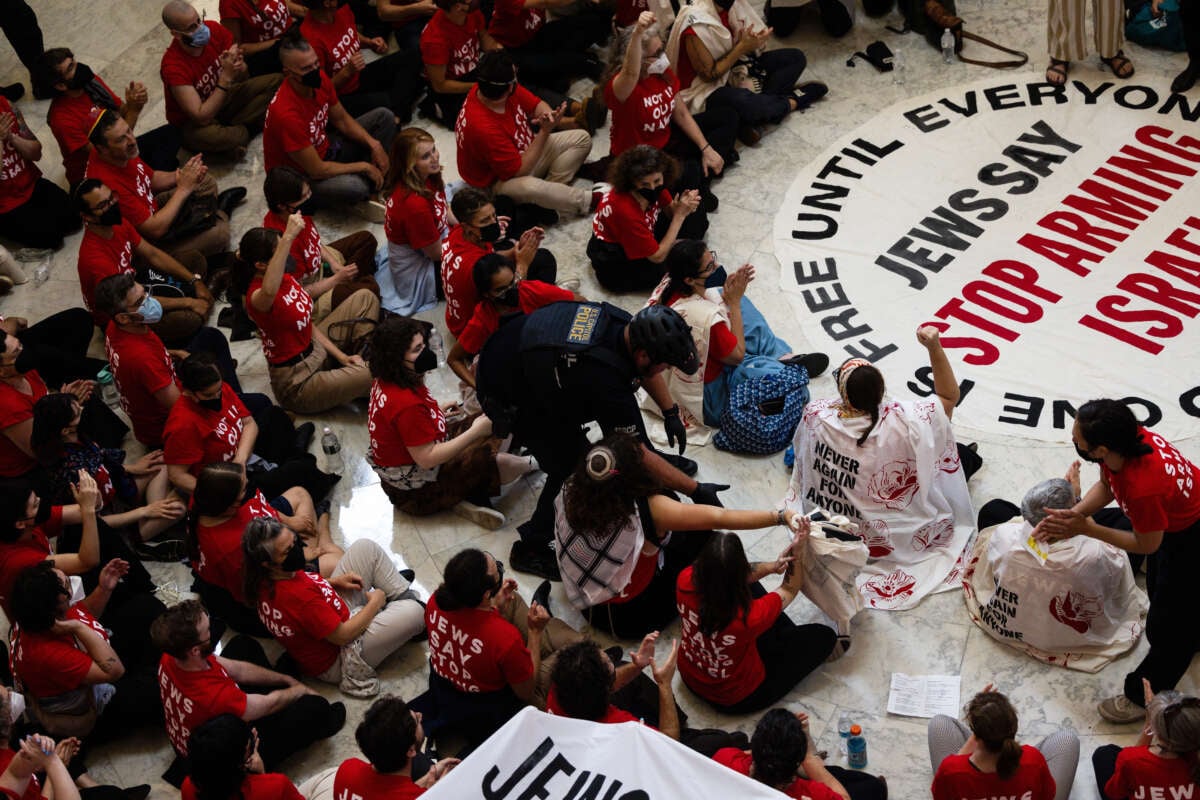Part of the Series
Struggle and Solidarity: Writing Toward Palestinian Liberation
In Judaism, the first 10 days of the new year — a period we are observing this week — are a time of committed reflection. As I reflect on this year of death and destruction, I think of all the lives that have been taken — 1,189 Israelis were killed or taken hostage and at least 42,000 Palestinians and likely far more were killed. Every human killed in the past year was someone else’s entire world.
In the wake of the tragic October 7 attacks, many people have come to understand that we cannot allow one tragedy to justify another. In response to politicians calling for death and destruction, people took to the streets, their campuses, their holy places and their social networks to call for a ceasefire in defense of the sanctity of life. These acts of solidarity and resistance are what give me hope in the face of despair over the terrible death toll.
When Rabbi Abraham Joshua Heschel returned from marching with Rev. Martin Luther King Jr., he wrote, “For many of us the march from Selma to Montgomery was about protest and prayer. Legs are not lips and walking is not kneeling. And yet our legs uttered songs. Even without words, our march was worship. I felt my legs were praying.” I have always been moved by Rabbi Heschel’s belief that protest can be an act of prayer, but this year I experienced it for myself.
On July 23, 400 members of Jewish Voice for Peace peacefully occupied the United States Capitol to demand that the United States stop funding the Israeli military as it destroys life and land in Gaza. I was surrounded by my community, hundreds of Jewish Americans who are resolutely committed to the freedom and safety of Palestinians. We reject the way the Israeli government has manipulated our sacred tradition to justify the mass murder of Palestinians.
In the midst of the protest, I had the honor of leading my fellow protesters in the Shema, the most sacred prayer in Judaism, which reminds us that all of us are echad, all are one. When I recite the Shema, I am reminded that Jewish safety is intertwined with Palestinian safety, that no one is free until all of us are free. I called out to my community: “When we say the Shema, we are declaring that all people are one. Today, we say it to declare that we are here, because we are one with the Palestinian people.” I called the words and 400 others joined me. As a rabbi and as a Jew, I have recited this prayer countless times, but I will never forget this moment where I felt not only our collective grief, but also our collective commitment to fighting for a world of safety and freedom for all.
As I finished praying the final word, with the sound of the Shema still echoing in the rotunda, a police officer grabbed my arms and handcuffed me, adding my name to the tens of thousands of others this past year, including thousands of American Jews, who were arrested for calling on the United States government to end the Israeli military’s destruction of Gaza.
During this most sacred period of the Jewish calendar, it is my prayer that we can continue to resist and speak out as we see the people of Gaza being bombed, starved and buried under rubble. We must keep speaking out because death has not stopped.
As I write this the Israeli military is expanding its assault, brutally invading and bombing Lebanon, killing civilians and leveling whole neighborhoods in Beirut. Over the past year, the Israeli military has bombed schools, hospitals, refugee camps, mosques and countless homes in what can only be understood as a brutal rebuke to international law. Indeed, the International Court of Justice has stated that the Israeli military is plausibly committing genocide in Gaza.
When I recite the Shema, I am reminded that Jewish safety is intertwined with Palestinian safety, that no one is free until all of us are free.
As a Jew, I understand how the crime of genocide reverberates for generations. As a rabbi, I am also horrified by the way the Israeli government is exploiting our sacred tradition to justify its brutal campaigns.
We conclude the High Holidays with Yom Kippur — the Day of Atonement. On this holy day, we reflect on our transgressions. We admit to our complicity in doing wrong and causing harm. We choose not to turn away from all that needs to be changed. And we commit to tikkun olam, the repairing of the world. In our name — our Jewish name — the United States continues to send billions of dollars to the Israeli military government. This is an utter betrayal of Jewish values.
The Jewish tradition teaches that pikuach nefesh, saving a soul, is the single most important obligation of every human being. The Israeli military, funded by the U.S. government, is destroying whole lives each and every day. So on the holiest week of the year, Jewish tradition inspires me to demand that our government stop sending weapons to the Israeli military.
5 Days Left: All gifts to Truthout now matched!
From now until the end of the year, all donations to Truthout will be matched dollar for dollar up to $50,000! Thanks to a generous supporter, your one-time gift today will be matched immediately. As well, your monthly donation will be matched for the whole first year, doubling your impact.
We have just 5 days left to raise $50,000 and receive the full match.
This matching gift comes at a critical time. As Trump attempts to silence dissenting voices and oppositional nonprofits, reader support is our best defense against the right-wing agenda.
Help Truthout confront Trump’s fascism in 2026, and have your donation matched now!
